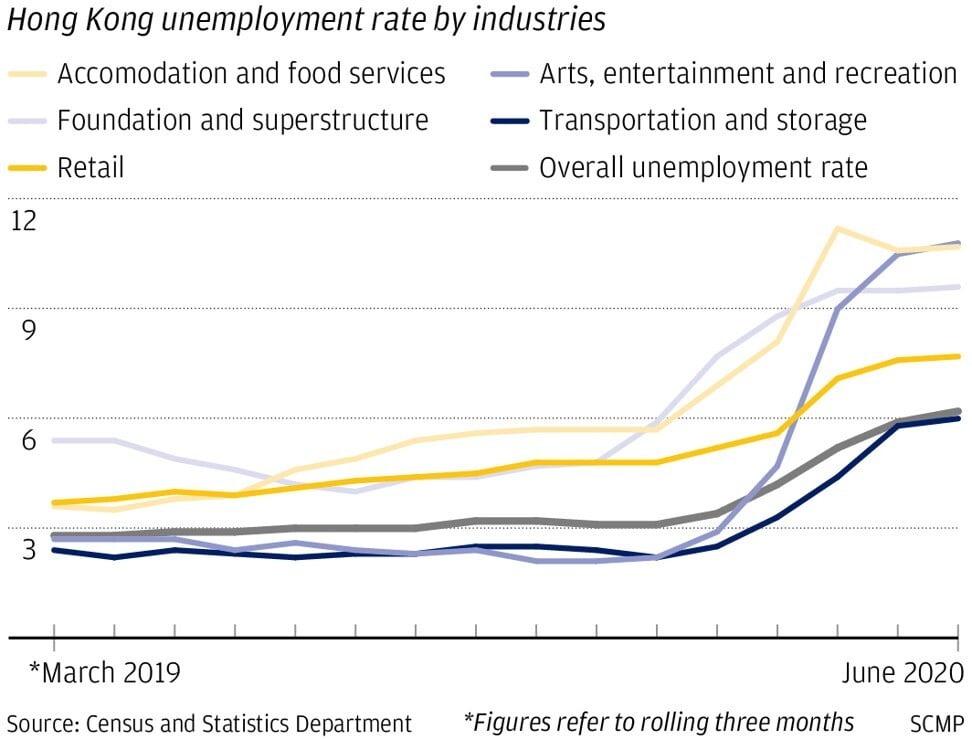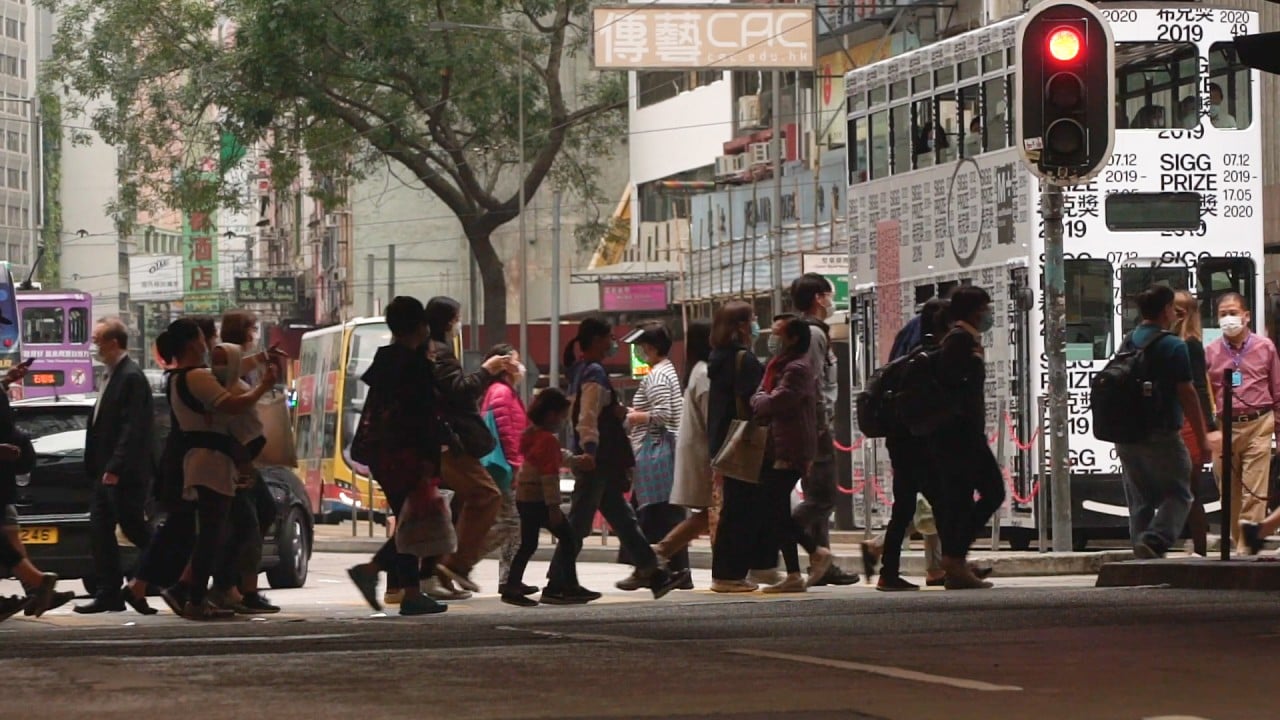
Beating the gloom: enterprising Hongkongers find ways to boost income, running yoga classes or selling at bazaars and online
- Depressing jobs scene drives some to turn talents, hobbies into potential money-spinners
- Call for government to provide more community venues for small businesses to set up stalls
An estimated 240,700 people in Hong Kong were out of work as of June, as the coronavirus pandemic took its toll on the economy. The bleak jobs market has driven some to get creative and put their talents and hobbies to good use. In the last instalment of a five-part series, Kanis Leung, Kathleen Magramo and Denise Tsang meet some of the city’s pandemic entrepreneurs. Read parts one, two, three, and four.
After 10 years in the job, Lena Lo enjoyed her life as a flight attendant, taking off to different parts of the world, earning about HK$20,000 a month.
Then the coronavirus pandemic struck and her airline told her in January to stay home, paying her about HK$10,000 a month, half what she earned before.
“No one ever expected that a thriving airline industry would crash like that. I haven’t been on a flight for half a year now,” said Lo, who is in her 30s and has a degree in marketing.
While waiting for the airline to decide her fate, she started running yoga classes, earning about HK$20,000.

Lo took up yoga three years ago as a way to relieve stress, and went on to qualify as a licensed instructor, allowing her to conduct private and group classes.
Her pandemic venture has left her feeling optimistic that she has something to fall back on, should things go wrong at work.
“If in the end the airline chooses to let go of crew, or if I don’t want to be a stewardess any more, I can say I’m lucky,” she said.
She knew of other grounded flight attendants dabbling in health and wellness enterprises, as well as e-commerce, to earn some income.
Two surveys this year indicated that even as the pandemic brought hard times and uncertainty on the job front, there were Hongkongers interested in starting out on their own.

A Standard Chartered survey of 1,000 people in Hong Kong last month found those aged 18 to 24 felt less confident about overcoming the impact of the pandemic, with two-fifths anticipating redundancy and more than half expecting their working hours to be cut.
“Nevertheless, Hong Kong people are keen to find alternative ways to increase their earnings during this difficult period,” the report said.

05:21
Companies need to foster caring and compassionate workplace culture during the Covid-19 pandemic
More than half said they would consider creating a second source of income source or learning new skills.
An earlier survey of 400 people by recruitment agency Randstad also found the spirit of enterprise alive among Hongkongers.
More than two-fifths said they would rather start their own business than learn a new skill and start over in a new field. More than half said entrepreneurship presented more opportunities.

But many were also aware of the risks and hesitant to take that leap, Natellie Sun, a managing director at Randstad, said.
Simon Lee Siu-po, co-director of the international business and Chinese enterprise programme at Chinese University, pointed out that the city’s high rents deterred newcomers from setting up small and medium-sized enterprises.
He suggested the government offer shop space or stalls in wet markets and other public facilities in the community, to let residents start their own businesses offering personal services, such as sewing or pet grooming.
“Entrepreneurship doesn’t have to be hi-tech. It can be more local, for residents to do something,” he said.

Home-made citrus brew a hit
Former garment buyer Stella Leung, 68, has attracted quite a following at community bazaars with her home-made concoctions of traditional Chinese health food products.
She began selling her products at bazaars last year, after she retired, to save for the future. She has monthly expenses of about HK$8,000, including HK$3,000 to support her mother.
For bazaar days, she slow-cooks lemons, dried mandarin peel and rock sugar for 13 hours to produce a citrusy brew said to provide relief for sore throats and strengthen the immune system.
She made more than HK$2,000 on July 5, when she set up a stall rent-free at a bazaar in the residential district of Mei Foo.
She said she could earn HK$10,000 if she went to several bazaars a month, but the reintroduction of pandemic restrictions has interrupted business for now.
“People our age, when we go to seek a job, no one would want to hire us,” she said. “If we have more bazaars and the government can provide cheaper venues, we will be very happy to earn a few hundred dollars,” she said.

02:02
Coronavirus: Hong Kong to ease social-distancing rules as city sees record 8.9% economic slump
The bazaar she was at last month was organised by the Supporting Grassroot Bazaar Alliance, and other stallholders sold items such as snacks, bags, and bottles of mosquito spray.
The event attracted hundreds of shoppers, and stallholders included jobless people trying to earn some extra cash to make ends meet.
Cheung Yin, a project officer at the alliance, said some of the 13 stalls earned around HK$500 and two or three took in about HK$1,000.
“With bazaars, grass-roots people can use their craftsmanship to do a simple business to improve their income,” he said, adding he hoped to run more weekly or monthly markets when social-distancing measures are eased.
Hong Kong jobs crisis sparks rise in serious emotional and mental health problems
A profit of HK$1,000 in a day
Chilli Wong, 22, who lost her stage management job in February, decided to put her cooking skills to work in June, selling food items via an online bazaar.
She made a profit of several hundred dollars selling Vietnamese rice paper rolls in the single-day event, organised by a non-governmental organisation, Concern For Grassroots' Livelihood Alliance.
Customers pre-ordered online or called in directly after seeing a live broadcast video of her offerings.
Although her takings were modest, Wong said: “I feel happy. There are people who appreciate you.”
She felt she could earn more if there were regular bazaars. She recalled selling Taiwanese egg crepes at a Lunar New Year food market in January, making a profit of more than HK$1,000 for a day’s work. Some customers were willing to wait up to 45 minutes for her food.
“If we can do it once a month, or make a place well-known for its food market where people can enjoy themselves, it will be better,” she said.

She was especially pleased that the event in January provided an opportunity for her to work together with her parents, who helped out at her stall.
With social-distancing measures in place, however, online bazaars might be the way to go for now, said Khong Kar-mun, organising officer at the NGO.
She said some of the other businesses which took part in the online bazaar in which Wong was involved earned more than HK$1,000.
Hosting an online event costs more than HK$30,000, which she said was cheaper than a physical bazaar which needed an outlay of HK$50,000 to HK$100,000 and usually meant a lot of red tape dealing with government departments.
Khong, who intends to organise more online sales events, said they appealed to people who had to take care of children and were unable to go to work, or leave their homes.
“Apart from earning income, joining an online bazaar makes them happy,” she said.

Wooing the social media crowd
Some budding entrepreneurs have taken to social media platforms and e-commerce to launch their new businesses.
Ivy Yung Ka-ying, 25, started her own online business selling imported snacks and groceries from the United States.
She earns more than HK$25,000 a month at a travel aggregator firm and is fortunate to be unaffected, even though the pandemic hit tourism hard, forcing many other employers to lay off staff or put them on unpaid leave.
Explaining why she went into business, Yung said: “I am just lucky I have not been affected so far. If I am also hit, I don’t think I will be able to get a job soon. So I thought to myself, why not start something I am interested in?”
She teamed up with her secondary schoolmate Michelle Chow Ying-ki, who lives in the United States, to launch a shop on Instagram, selling food items not common in Hong Kong, such as onion salt and mochi rice nuggets.
Although they have yet to break even, Yung said: “I feel I should create something that belongs to me with what I like to do. The sense of fulfilment is greater.”

Executive pastry chef Dhilmin Silva and his Hongkonger wife Jenny, a conference manager, were working in Bangkok until the pandemic brought them back to Hong Kong.
When the hotel where he worked closed for renovations until January next year, the couple, in their 30s, decided to return.
She still has her job, which pays about HK$35,000 a month, but while he is looking for work, they have launched a business over Instagram.
They designed face mask holders made of environmentally friendly beeswax coated fabric and began selling them at HK$70 apiece on their Instagram store called x88lifestyle.
“Our product is a little more innovative than the plastic face mask pockets in the market,” said Silva, who is from Sri Lanka. “There’s a risk in everything but why not? Let’s see how it goes.”
Their month-old shop selling eco-friendly mask holders is still in its early stages, but they are optimistic after receiving about 10 orders and inquiries from buyers in Japan.

A windfall from masks
When the pandemic made masks a necessity, Winnie Ho got busy producing colourful handmade creations she listed on the online marketplace Carousell.
In her 50s, she has earned about HK$10,000 a month since February selling her cloth masks, on top of the comfortable income she earns from various businesses and investments.
Four years ago she started selling tote bags made from fabrics she collected on her travels.
“The pandemic gave me an opportunity to turn my hobby into an additional source of income,” Ho said. “With more time stuck at home I could spend more time designing the mask.”
She was thrilled when a customer related how she wore Ho’s mask to visit her mother in hospital. “Her mother loved seeing the colourful mask,” Ho said. “My customer thanked me and ordered another 10.”

04:39
Coronavirus: What impact will the economic fallout from the Covid-19 pandemic have on you?
Others have also flocked to Carousell to sell second-hand and handmade goods to earn some cash. Between February and June, more than 860,000 local transactions were made, with each seller making about HK$4,400 on average, up 19 per cent from before the pandemic struck.
Information technology entrepreneur Keith Li King-wah is not surprised that there are Hongkongers eager to start out in business during hard times.
Major crises affected Li, 46, over the past two decades and he had to pick himself up more than once. Even after losing his entire savings of HK$2 million running his first venture between 2003 and 2008, he has no regrets choosing to be his own boss.
“The setbacks did not bring me to my knees,” he said. “I love new technology and I love being a creator.”
In 2009, he co-founded Innopage, an award-winning developer of mobile applications with a 20-strong team working in Kwun Tong.
“Starting a business is like making a bet,” he said. “It means taking risks.”
Encouraging young Hongkongers who go into business to persevere if things went wrong, he said: “There are always bad and good times. To succeed, one needs a higher emotional quotient to overcome adversity.”








